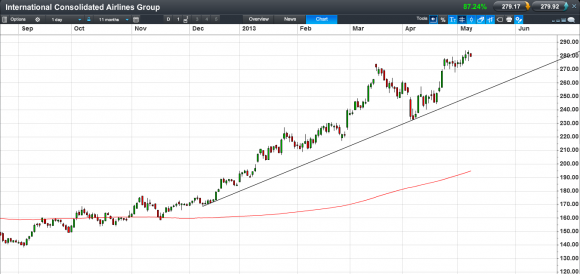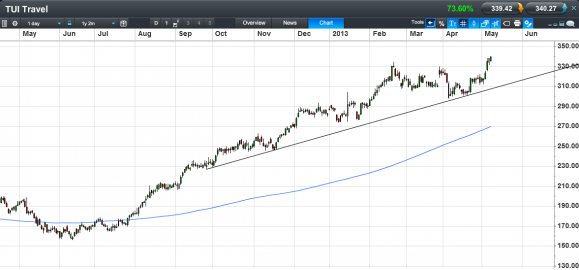
- Where To Trade the Travel & Leisure Sector?
- Travel & Leisure Sector Constituents
- Travel and Leisure Sector Analysis
Where Can I Trade the Travel & Leisure Sector?
You can currently spread bet on the travel & leisure sector with: You may be able to trade this sector with other brokers.Travel & Leisure Sector Constituents
As of 19 Dec 2017, the following firms make up the FTSE 350 travel & leisure sector:- 888
- Carnival
- Cineworld
- Compass
- Dominos
- Easyjet
- FirstGroup
- Go-Ahead Group
- Greene King
- GVC
- InterContinental Hotels
- IAG
- Ladbrokes Coral
- Marstons
- Merlin Entertainments
- Millennium and Copthorne
- Mitchells and Butlers
- National Express
- Paddy Power Betfair
- Playtech
- Rank
- SSP Group
- Stagecoach
- Thomas Cook
- TUI Travel
- JD Wetherspoon
- Whitbread
- William Hill
- Wizz Air
For more details on a particular company, click on the relevant link above.
For the larger firms we have added the latest broker ratings, real-time charts and prices as well as a guide to trading the individual company.
Trading Sectors
For more on Sectors, also see our guide to trading and spread betting on Sectors.Travel and Leisure Sector Analysis
Below, we have a number of articles which discuss the UK travel and leisure sector.Most of the market conditions will have changed since the analysis was written and the fundamental arguments may no longer apply.
Nevertheless, we feel the analysis is still useful if you are new to trading this sector because it talks through many of the factors that positively and negatively impact these companies.
Using Charts to Analyse the Travel Sector
Below, an article from IG, 12-June-14.In this trading video, IG talks to Rakesh Shah, from Kingly Capital, about how to identify related charts, analyse short and long-term patterns, and recognise potential opportunites within the Travel Sector.
Travel Sector Endures Turbulent Period
Below, an article by Michael Hewson, CMC Markets, 20-May-13.The travel sector has endured a turbulent last few years with airlines and travel firms suffering as consumers across Europe tighten their belts.
This comes inline with a backdrop of rising energy prices and shrinking incomes which in turn put pressure on company profit margins.
This can be borne out of the fact that we remain well below the 2007 peaks of €219.56 in the Stoxx Europe 600 Travel and Leisure sector, hitting lows of €82.26 in March 2009.
Various external factors including the Arab Spring, the Eurozone debt crisis as well as volcanic dust clouds have hit turnover, resulting in some high profile collapses and shrinkage in the travel sector.
Over the past twelve months we’ve seen a significant recovery, despite tepid economic growth which suggests that the easy central bank money has driven a large part of these gains.
We’ve seen some success stories like budget carrier, EasyJet, go from strength to strength, offering value to business travellers and setting itself up as a realistic alternative to the slow to adapt global brands like British Airways, now International Consolidated Airlines.
International Consolidated Airlines
British Airways has been buffeted by some questionable acquisitions, particularly with the purchase of the struggling Spanish carrier, Iberia.This has proved to be a massive drain on the company’s profitability, though we could well have seen the worst with respect to this, after last year’s combined loss of nearly €1bn.
This week’s Q1 earnings numbers from IAG are expected to continue to show the effects of the protracted restructuring costs of the Iberia part of the business, and the integration of Vueling, the Spanish budget carrier.
The recent agreement with Iberia’s unions to cut 3,100 jobs, while positive, could well impact on profits as the lowers costs that had been anticipated could well take longer to filter through.
As such, while the British Airways numbers may remain resilient, if the recent passenger traffic numbers are any guide, Iberia may remain a drag for some time to come. The outlook statement going forward may be more important than the actual numbers.
We could also find out more about the recent speculation of a possible bid for the Bankia stake in Iberia from a Qatari consortium of investors, which if true could be seen as a positive.

With the current share price at two year highs, expectations remain high that the turnaround plan will bear fruit, which suggests that any good news could already be in the price.
The problem IAG has is that it now has to deal with Easyjet which has just joined the FTSE 100 and is continuing to take great chunks out of IAG’s European market share, particularly in the business travel sector.
Easyjet
In April, Easyjet flew 2.5m more passengers, bringing the total number of passengers carried to nearly 60m in the past twelve months.This greatly strengthens CEO Carolyn McCall’s hand with respect to her plans to buy 200 new planes to replace older less fuel efficient aircrafts but also to expand capacity. This is currently near the 90% level and something founder, Stelios, has been a vehement opponent of.
These expansion plans have gained the backing of a number of institutional investors who have obviously looked at recent gains in the Easyjet spread betting market and like the current trajectory of the business and the growth potential.
TUI Travel
Away from the airlines sector but not unrelated in terms to the travel sector, the latest results from TUI Travel are likely to attract some scrutiny this week.The company has no doubt benefitted from the well documented woes of sector peer Thomas Cook. However, the recent turnaround in that business could well see the company start to see that market share drift back.
One advantage that TUI does have is a much wider geographical reach across Europe which should insulate it from the current stagnation in Europe.
The question is whether that means that they are fairly valued given that they are trading at 5-yr highs, or whether any disappointment in terms of January and February bookings numbers translates into a drop in revenues and profits expectations.
The recent trading update seemed to suggest that the UK and Scandinavia was showing some growth while the French business was struggling.
The recent cold spell in Europe could well have seen an increase in summer holiday bookings as recession weary Europeans shell out some hard earned cash on a short break.

Thomas Cook
Thomas Cook on the other hand, under the new management of Harriet Green, continues to wrestle with the costs of restructuring a business overburdened with debt, with talk of a rights issue of £400m in recent days.The recent rise in the share price from levels of 30p at the end of last year to the current levels around 130p would seem to suggest that investors are confident that the current plan is on the right track.
Further costs savings were announced in March with the closure of multiple shops which were no longer profitable, due to the increasing numbers of people who now shop online for their holidays.
The problem the company has is they are now playing catch up as more and more holiday makers go all-inclusive to save money, which is where companies like TUI and Virgin Holidays have a head start.
Spread betting and CFD trading carry a high level of risk to your capital and you may lose more than your initial investment. Spread betting and CFD trading may not be suitable for all investors. Only speculate with money that you can afford to lose. Please ensure you fully understand the risks involved and seek independent financial advice where necessary.
